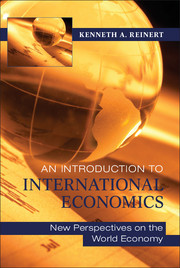1 - Windows on the World Economy
Summary
In the late 1990s, I met an anthropology student who had just returned from a year in Senegal. As soon as she learned that I was an international economist, she asked, “Can you tell me about the CFA franc devaluation? Why was it necessary? It has made life very difficult in Senegal.” Some years later, I met a religion student who had just returned from a semester of working in a health clinic in Haiti. As soon as he learned that I was an international economist, he asked, “Can you tell me about structural adjustment programs? I’m concerned about how they are being applied to Haiti.” More recently, my son's school bus driver quizzed me about the Doha Round of multilateral trade negotiations.
These are not rare incidents. I receive such inquiries on a routine basis from all sorts of people. Increasingly, it seems, more and more of us – religion students, bus drivers, as well as economics and business students – need to know something about the world economy. Why is this? Put simply, the world economy impacts us all in increasingly significant ways. It has become very difficult to take shelter in our academic majors and professions without being knowledgeable about the fundamentals of international economics. Increasingly, trade flows, exchange rates, and multinational enterprises matter to us all, even if we would prefer that they did not. The global financial crisis that began in 2007 made this apparent in the most dramatic way.
- Type
- Chapter
- Information
- An Introduction to International EconomicsNew Perspectives on the World Economy, pp. 1 - 16Publisher: Cambridge University PressPrint publication year: 2011



